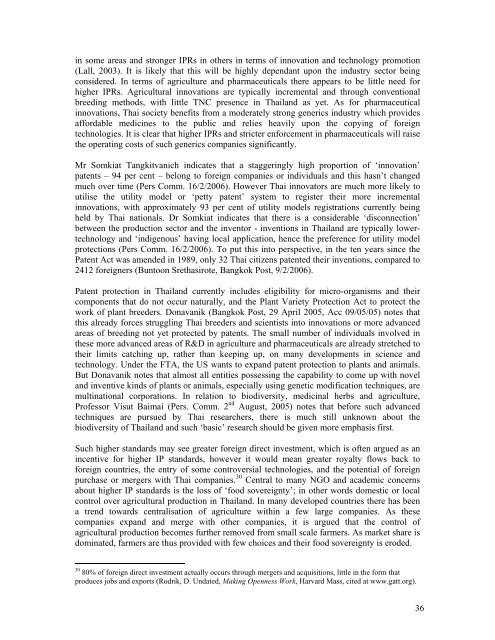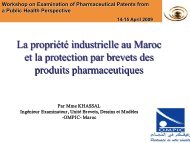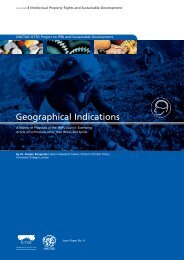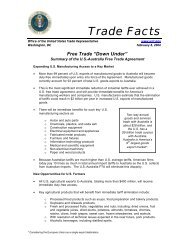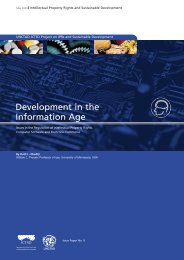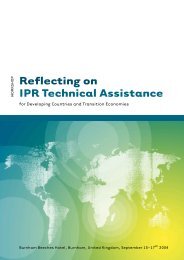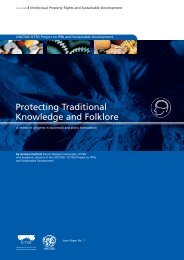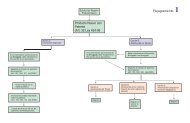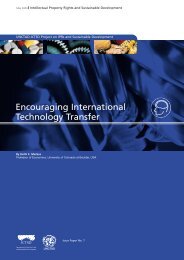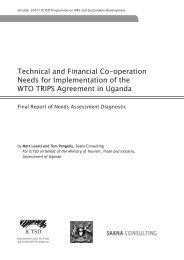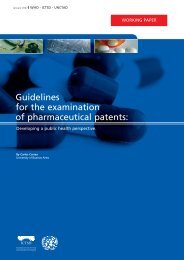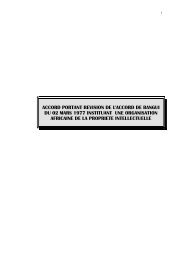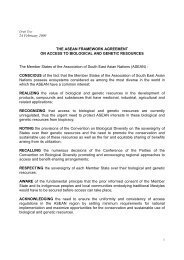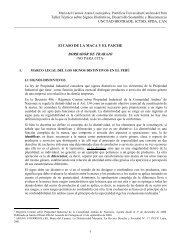Governance and Micropolitics of Traditional ... - IPRsonline.org
Governance and Micropolitics of Traditional ... - IPRsonline.org
Governance and Micropolitics of Traditional ... - IPRsonline.org
Create successful ePaper yourself
Turn your PDF publications into a flip-book with our unique Google optimized e-Paper software.
in some areas <strong>and</strong> stronger IPRs in others in terms <strong>of</strong> innovation <strong>and</strong> technology promotion<br />
(Lall, 2003). It is likely that this will be highly dependant upon the industry sector being<br />
considered. In terms <strong>of</strong> agriculture <strong>and</strong> pharmaceuticals there appears to be little need for<br />
higher IPRs. Agricultural innovations are typically incremental <strong>and</strong> through conventional<br />
breeding methods, with little TNC presence in Thail<strong>and</strong> as yet. As for pharmaceutical<br />
innovations, Thai society benefits from a moderately strong generics industry which provides<br />
affordable medicines to the public <strong>and</strong> relies heavily upon the copying <strong>of</strong> foreign<br />
technologies. It is clear that higher IPRs <strong>and</strong> stricter enforcement in pharmaceuticals will raise<br />
the operating costs <strong>of</strong> such generics companies significantly.<br />
Mr Somkiat Tangkitvanich indicates that a staggeringly high proportion <strong>of</strong> ‘innovation’<br />
patents – 94 per cent – belong to foreign companies or individuals <strong>and</strong> this hasn’t changed<br />
much over time (Pers Comm. 16/2/2006). However Thai innovators are much more likely to<br />
utilise the utility model or ‘petty patent’ system to register their more incremental<br />
innovations, with approximately 93 per cent <strong>of</strong> utility models registrations currently being<br />
held by Thai nationals. Dr Somkiat indicates that there is a considerable ‘disconnection’<br />
between the production sector <strong>and</strong> the inventor - inventions in Thail<strong>and</strong> are typically lowertechnology<br />
<strong>and</strong> ‘indigenous’ having local application, hence the preference for utility model<br />
protections (Pers Comm. 16/2/2006). To put this into perspective, in the ten years since the<br />
Patent Act was amended in 1989, only 32 Thai citizens patented their inventions, compared to<br />
2412 foreigners (Buntoon Srethasirote, Bangkok Post, 9/2/2006).<br />
Patent protection in Thail<strong>and</strong> currently includes eligibility for micro-<strong>org</strong>anisms <strong>and</strong> their<br />
components that do not occur naturally, <strong>and</strong> the Plant Variety Protection Act to protect the<br />
work <strong>of</strong> plant breeders. Donavanik (Bangkok Post, 29 April 2005, Acc 09/05/05) notes that<br />
this already forces struggling Thai breeders <strong>and</strong> scientists into innovations or more advanced<br />
areas <strong>of</strong> breeding not yet protected by patents. The small number <strong>of</strong> individuals involved in<br />
these more advanced areas <strong>of</strong> R&D in agriculture <strong>and</strong> pharmaceuticals are already stretched to<br />
their limits catching up, rather than keeping up, on many developments in science <strong>and</strong><br />
technology. Under the FTA, the US wants to exp<strong>and</strong> patent protection to plants <strong>and</strong> animals.<br />
But Donavanik notes that almost all entities possessing the capability to come up with novel<br />
<strong>and</strong> inventive kinds <strong>of</strong> plants or animals, especially using genetic modification techniques, are<br />
multinational corporations. In relation to biodiversity, medicinal herbs <strong>and</strong> agriculture,<br />
Pr<strong>of</strong>essor Visut Baimai (Pers. Comm. 2 nd August, 2005) notes that before such advanced<br />
techniques are pursued by Thai researchers, there is much still unknown about the<br />
biodiversity <strong>of</strong> Thail<strong>and</strong> <strong>and</strong> such ‘basic’ research should be given more emphasis first.<br />
Such higher st<strong>and</strong>ards may see greater foreign direct investment, which is <strong>of</strong>ten argued as an<br />
incentive for higher IP st<strong>and</strong>ards, however it would mean greater royalty flows back to<br />
foreign countries, the entry <strong>of</strong> some controversial technologies, <strong>and</strong> the potential <strong>of</strong> foreign<br />
purchase or mergers with Thai companies. 30 Central to many NGO <strong>and</strong> academic concerns<br />
about higher IP st<strong>and</strong>ards is the loss <strong>of</strong> ‘food sovereignty’; in other words domestic or local<br />
control over agricultural production in Thail<strong>and</strong>. In many developed countries there has been<br />
a trend towards centralisation <strong>of</strong> agriculture within a few large companies. As these<br />
companies exp<strong>and</strong> <strong>and</strong> merge with other companies, it is argued that the control <strong>of</strong><br />
agricultural production becomes further removed from small scale farmers. As market share is<br />
dominated, farmers are thus provided with few choices <strong>and</strong> their food sovereignty is eroded.<br />
30 80% <strong>of</strong> foreign direct investment actually occurs through mergers <strong>and</strong> acquisitions, little in the form that<br />
produces jobs <strong>and</strong> exports (Rodrik, D. Undated, Making Openness Work, Harvard Mass, cited at www.gatt.<strong>org</strong>).<br />
36


